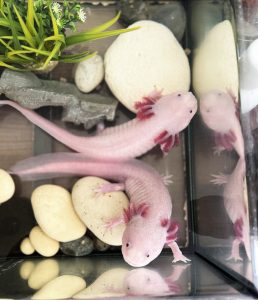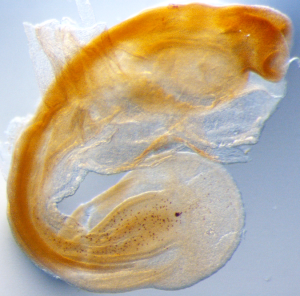
June 3, 2024, by sbzsk4
Introduction to Luke Simpson and his work in developmental biology
Hello! I’m Luke Simpson, I am a postdoctoral researcher at the University of Nottingham. I am the new Early Career Representative for Biosciences, and I would like to share some insights into current and past work in the field of developmental biology.
My academic career started under the supervision of Professor Andrew Johnson. My PhD focused on deeply conserved principles of development and involved investigating the roles of proteins needed for development in distantly related animals. Specifically, I was interested in which proteins were needed for cells to become pluripotent. Pluripotency is the remarkable ability of early embryonic cells to transform into any cell type in the body in response to specific signals. The uniqueness of any animal depends on the ability to form specialised cell types, the number of these cell types within the embryo and adult can vary significantly between species. For example, a sponge may have only 3 cell types whilst a human has over 200! By studying both axolotl embryos and mammalian stem cell models, I explored how pluripotency might be a driving force for evolutionary changes.
I am now in my third year of a postdoc at UoN working under Professor Ramiro Alberio. I have traded salamander embryos for pig, cow and sheep stem cells and embryos to delve into the conserved principles of development. Our research group is focused on how early mammalian cells decide their fates. The use of pig embryos is particularly intriguing due to their close resemblance to human embryos, making them an invaluable model for studying human developmental processes and diseases. Due to the similarities pigs are also being explored for their potential for organ transplants in humans.


To investigate this vital period of development, we often treat cells or embryos with a variety of biological agents and observe how this influences their decision-making processes using specialised techniques. For instance, through immunofluorescence, we apply fluorescently labelled antibodies to proteins of interest, which can then be detected by specialised microscopy. Additionally, we can isolate individual cells and, by employing reverse transcription and sequencing, infer the actions of thousands of cells simultaneously. Recently, our lab has developed advanced methods to mimic an embryo using only cell aggregates and a specialised treatment regime. This approach allows us to study gastrulation—a critical phase of early development—with an unprecedented level of detail. As the lab grows, I have had the opportunity to collaborate with many colleagues who specialise in advanced cell culture, microscopy, and even mathematical modelling.
We hope to feature more postdoc stories on this page in the coming months so check back again soon!

No comments yet, fill out a comment to be the first

Leave a Reply